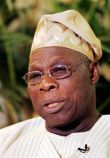Nigerian president warns of Darfur genocide
Oct 10, 2006 (ADDIS ABABA) — Nigerian President Olusegun Obasanjo warned of a possible genocide in the Darfur region on Tuesday, as cash-strapped African peacekeepers struggle to stem the violence in Sudan’s remote west.
 Nigeria is the largest troop contributing nation to the African Union (AU) force in Darfur, which is caught in an international diplomatic tug-of-war over a U.N. takeover of the peacekeeping mission.
Nigeria is the largest troop contributing nation to the African Union (AU) force in Darfur, which is caught in an international diplomatic tug-of-war over a U.N. takeover of the peacekeeping mission.
“It is not in the interest of Sudan nor in the interest of Africa nor indeed in the interest of the world for us all to stand by and see genocide being developed in Darfur,” Obasanjo said in a speech at the AU headquarters in Addis Ababa.
The AU has been a diplomatic ally to Sudan, at odds with the United Nations over the past two years because of the rape, murder and pillage in its remote Darfur region which has forced 2.5 million people from their homes into wretched camps.
The pan-African body has in the past avoided calling the Darfur violence genocide, a term used mainly by Washington and rejected by Khartoum.
Until January 2006, Obasanjo was the AU’s top diplomat.
While diplomatic stalemate continues over Khartoum’s rejection of a U.N. Darfur peacekeeping mission, violence has increased with a dozen aid workers killed and tens of thousands more forced to flee renewed fighting despite a May peace deal.
Since the May accord signed by only one of three rebel negotiating factions, the AU has been able to do little in Darfur but observe the descent into chaos with inter-rebel clashes and a new rebel alliance declaring renewed hostilities with the government.
Khartoum says a U.N. force is a front for a Western invasion and an attempt at recolonisation. Critics say it really fears the troops would be used to arrest any official likely to be indicted by the International Criminal Court investigating suspected war crimes in the region.
Around 200 U.N. support staff are to be sent to Darfur to strengthen the AU mission, and further African troops are being sought to bolster the around 7,000-strong force which patrols a region the size of France.
“If the need arises and if the AU has to secure more troops and if the resources are found, Nigeria will surely consider giving more troops to the AU,” Obasanjo said.
Other contributing countries include Rwanda, Senegal, Egypt and South Africa.
“A great challenge before us is how to strengthen (the AU) until the transition to the United Nations with the support of Sudan and while retaining its African ownership and character,” he added.
The AU mission, dependent on donations from Western governments, has had difficulty paying salaries and buying military equipment to cope with Darfur’s hostile arid terrain.
(Reuters)
